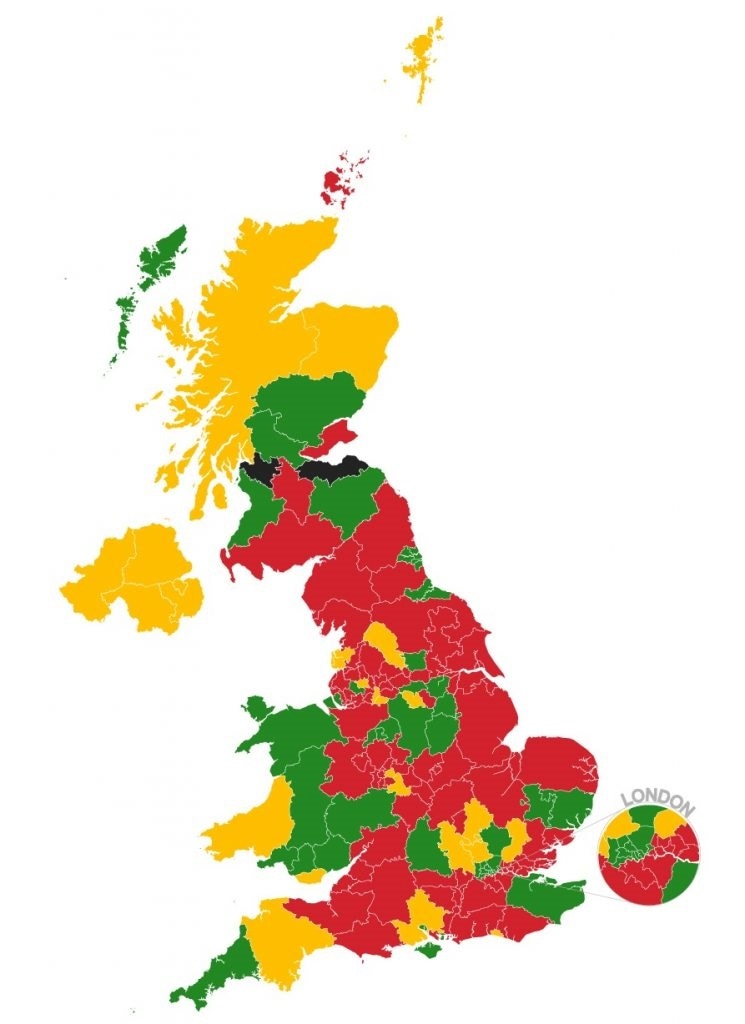New research published today in a peer review journal shows only 26% of areas in the UK have an effective pathway in place for the early detection of liver disease. Three quarters of people in the UK are currently diagnosed when it is too late for effective intervention or treatment and one in four people diagnosed late in hospital sadly die within a couple of months.
The research, produced from a survey undertaken by the British Liver Trust, used a Freedom of Information request and shows for the first time how three quarters of areas in the UK have little or no formal structures in place for detecting and managing liver disease and liver cancer.
This is in sharp contrast to other chronic conditions such as diabetes and heart disease, where patients receive standardized care. The mapped survey results (see below) show huge swathes of the country (marked in red) do not have any effective patient pathway in place for the early detection of liver disease.

Areas in red have no pathway in place. Amber denotes areas with a partial pathway or pathway in development. Green areas have a full pathway in place. Areas in black did not respond. Image Credit: British Liver Trust
The charity is now calling for earlier detection of liver disease and better patient care across all regions of the UK to be prioritized, and is working to influence healthcare commissioners.
Dr Helen Jarvis, Clinical Advisor for the British Liver Trust and lead author of the research, says: “Anyone who has liver disease, or is at risk of getting it, should get the medical care and advice they need no matter where in the country they live. The publication of this new data shows that, unfortunately, in the UK this is not yet the case. There are pockets of good practice, but there are also many areas that do not have a consistent approach to testing for and diagnosing liver disease. It shouldn’t be a postcode lottery.
“GPs and other healthcare professionals in primary care are doing a fantastic job under a lot of pressure, but in many areas, they’re working within a system that doesn’t allow them to detect and treat liver disease effectively. Unfortunately, many GPs also report a lack confidence and knowledge when it comes to managing the condition. Sadly, this means that in many cases, people with liver disease are diagnosed far too late when treatment options are limited. This had led to thousands of avoidable deaths.
“The liver is an incredibly resilient organ, but only up to a point. Symptoms of liver disease often only appear once damage has progressed and the liver is starting to fail. However, 90% of liver disease is preventable and, in many cases, it’s reversable if caught in time. That’s why early detection and prevention are key.”
The British Liver Trust hears every day from patients who have been diagnosed late. Hilary Todd had non-alcohol related fatty liver disease and needed a liver transplant in 2017. She says:
“I hadn’t drunk alcohol for about 25 years and I thought I led a fairly healthy life until one day I suddenly felt very faint and vomited up a sink-full of blood. I was rushed to hospital and was later diagnosed with cirrhosis. It was too late for me to be effectively treated through lifestyle advice and I was told I needed a liver transplant.
“I will be forever grateful for all the wonderful doctors and nurses who cared for me and I know I am one of the lucky ones. However, my illness and the liver transplant could have been avoided if my condition had been picked up much earlier.”
Pamela Healy OBE, Chief Executive of the British Liver Trust, said: “Shockingly, deaths due to liver disease have more than doubled in the last 20 years and the condition is expected to overtake heart disease as the biggest cause of premature death in the UK in the next few years. Obesity, alcohol and viral hepatitis are the three main risk factors for preventable liver disease."
We need to take urgent action to stop this silent killer in its tracks. Although the results of our research are very concerning, we do know that there are areas of good practice and that the changes we’re calling for are entirely possible and will save many lives. We now need to take what’s working well in those areas with good liver patient care and apply them in others so that every person with liver disease gets the best possible care, no matter where in the UK they live.”
Pamela Healy OBE, Chief Executive, British Liver Trust
Source:
Journal reference:
Williams, R., et al. (2021) Addressing liver disease in the UK: a blueprint for attaining excellence in health care and reducing premature mortality from lifestyle issues of excess consumption of alcohol, obesity, and viral hepatitis. The Lancet. doi.org/10.1016/S0140-6736(14)61838-9.